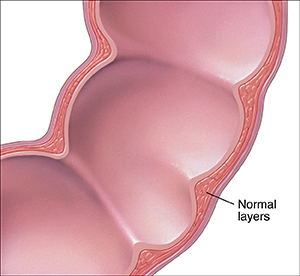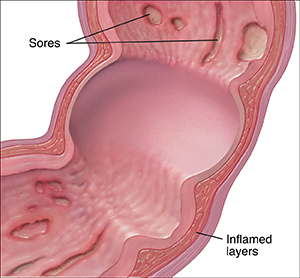Your Child Has Crohn's Disease
Crohn’s disease is a type of inflammatory bowel disease (IBD). It causes swelling, inflammation, and sores in your child’s digestive tract. The whole tract may be affected, from the mouth to the anus (where stool leaves the body). But it most often affects the end of the small bowel and beginning of the colon. Swelling, inflammation, and sores make it harder for the body to get nutrients from food. This can make your child feel very ill. It can also lead to problems with growth.
There is no known cure for Crohn's disease. But there are treatments and things you can do at home to manage your child's symptoms.
What are the symptoms of Crohn’s disease?
Common symptoms of Crohn’s disease include:
Belly pain.
Fever.
Diarrhea.
Urgent need to move bowels.
Failure to grow (short stature).
Nausea and vomiting.
Weight loss.
Severe tiredness.
Sores in the mouth or around the anus.
Bleeding from the rectum.
Abscess (infection) or fistula (abnormal opening in the digestive tract).
How is Crohn’s disease diagnosed?
The doctor will examine your child and ask about their symptoms. Your child may also need tests. These may include:
Upper GI series with small bowel follow-through. This is a series of X-rays of your child’s upper digestive tract and small intestine.
Blood and stool tests. These tests are done to check for signs of inflammation or infection, watch for a low red blood cell count (anemia), and check for other problems.
CT or MRI scans. These tests take detailed pictures from outside your child’s body.
Endoscopy and colonoscopy. During these tests, a flexible tube with a camera is used to view the inside of your child's digestive tract. This allows the doctor to take a tiny tissue sample (biopsy).
Wireless capsule endoscopy. In this test, your child swallows a tiny wireless camera like a pill. The camera takes pictures of the inside of the intestine. Pictures are sent to a computer. The camera comes out in the stool with a bowel movement.
How is Crohn’s disease treated?
Treatment can reduce symptoms and help your child feel better. Treatment may include:
Medicines. These help reduce swelling, inflammation, and sores. They may be taken by mouth or injected.
Supplements. These give extra nutrition.
Changes in diet. These can include a bland (less spicy) diet, low-residue diet, lactose-free diet, or other changes. What's best for your child depends on their disease and which problems it's causing.
Bowel rest. This gives the intestines time to recover. If your child’s symptoms have been severe, the doctor may suggest TPN (total parenteral nutrition) for your child. During TPN, your child gets nutrients through a vein in the arm or chest. This gives your child nutrition without food having to make its way through the digestive tract.
Surgery. Taking medicine may not be enough to prevent flare-ups. In this case, the doctor may talk to you about a surgery to help control symptoms.
Handling flare-ups
Flare-ups are times when your child feels symptoms. These may still happen despite treatment. These tips can help you and your child deal with flare-ups:
Give your child more time to get ready in the morning. During a flare-up, your child may need longer bathroom time. Stress and pressure can make symptoms worse. Make sure your child doesn’t feel rushed.
Talk to your child’s teachers and school officials about your child’s condition. Ask them to let your child use the bathroom as needed. This can help prevent accidents. Also, your child may miss school more often during flare-ups. Work with their teachers to help your child keep up with schoolwork. Your child should qualify for school accommodations under Section 504 of the Rehabilitation Act of 1973. Your doctor can help you with this by writing a letter to the school.
Let your child be active. Having Crohn’s disease doesn’t mean your child can’t play sports or be active. During flare-ups, your child might not feel well enough to be active. Let your child decide how much activity feels okay. Encourage your child to be active when they are feeling good.
Help your child eat a healthy diet. A healthy diet provides good nutrition for growth. Talk to your child about making healthy food choices when away from home.
Make sure your child takes all of their medicines. This can help reduce the number of flare-ups.
Look into Crohn’s disease support groups and resources. If your child is feeling alone or different from peers, a support group can help.
Following up with your child's doctors
Children with Crohn's usually see a specialist called a gastroenterologist. This type of doctor is an expert in problems with the digestive tract.
After your child's symptoms are under control (in remission), the gastroenterologist will want to see your child 3 to 4 times a year. Your child's primary doctor and gastroenterologist will work together to see that your child's vaccines are up to date. They'll also watch your child's growth and well-being. Tests to watch for problems may be done, such as:
Bone scans (painless tests that check the health of your child’s bones).
Eye exams.
Blood tests.
Learn more about living well with Crohn’s disease
Check out these resources:

